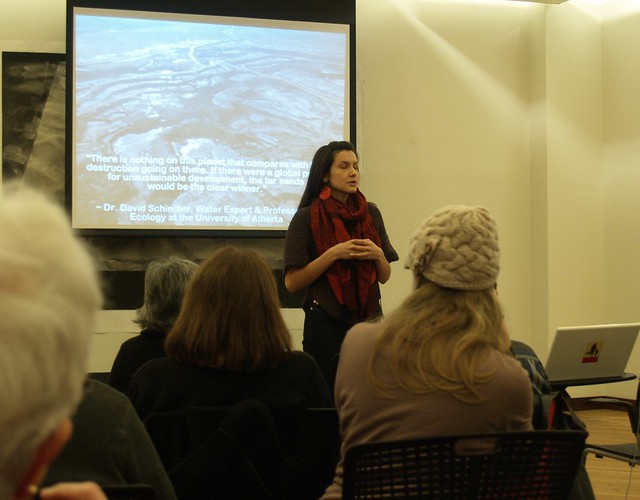Tar sands is a filthy fuel, Louisville members learn
 Jefferson County chapter members learned about tar sands extraction “and why extracting oil from them is a really bad idea“ during a presentation from Melina Laboucan-Massimo Monday evening.
Jefferson County chapter members learned about tar sands extraction “and why extracting oil from them is a really bad idea“ during a presentation from Melina Laboucan-Massimo Monday evening.
Melina is from the Cree First Nation in northern Alberta, Canada and was in Kentucky as a featured speaker at the I Love Mountains rally. She is a leader in the U.S. and Canada against tar sands extraction, including the controversial Keystone XL pipeline."[Tar sands extraction] uses more water, more energy and produces more toxic waste than other forms of energy," Melina revealed. That includes 1.5 barrels of toxic byproduct and 3-5 barrels of water for each one barrel of oil produced.
There are large deposits of tar sands in Canada. The rush to extract the oil is driven by the appetite for oil in the United States, and much of it would get here through the proposed Keystone pipeline.
"We're seeing massive mines that cover a whole landscape," Melina described. If allowed to continue, tar sands extraction will destroy 141,000 square kilometers – about the size of Florida.
National Geographic magazine reported in a March 2009 article about the Canadian oil sands, that "Nowhere on Earth is more earth being moved these days than in the Athabasca Valley [northern Alberta]."
Melina said pictures and stories of mountaintop removal are similar to what she and her family have experienced from the tar sands industry. Those impacts include poisoned and lost water, increases in cancer and a variety of health problems, and the myth that the industry will bring prosperity to a region.
"Billions of dollars have been taken out of the region and still my family has no running water," Melina said.
A number of KFTC members have been active in efforts to stop the Keystone XL pipeline, including action at the White House last year.
"I see great hope that so many of us are standing together to create a more just world," said Mark Steiner in his introduction of Melina. "This is a good sign for our species and a good sign for the future of life."
He thanked Melina for coming to join Kentuckians in standing up against mountaintop removal. "We stand in solidarity with you and the people of the Cree First Nation."
Recent News
Kentucky’s past legislative session showed alarming trend toward government secrecy
Churchill Downs takes more than it gives. That's why the Kentucky Derby is a no-go for me
‘We must never forget.’ Kentucky town installs markers for lynching victims.
Featured Posts
TJC Rolling Out The Vote Tour – a KFTC Reflection Essay
KFTC Voter Empowerment Contractor Reflection Essay
Voting is Power
Archives
- Home
- |
- Sitemap
- |
- Get Involved
- |
- Privacy Policy
- |
- Press
- |
- About
- |
- Bill Tracker
- |
- Contact
- |
- Links
- |
- RSS



Add new comment